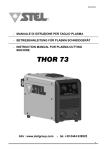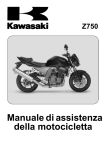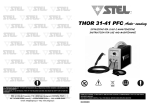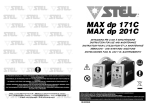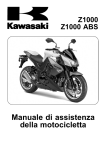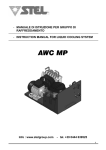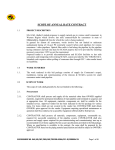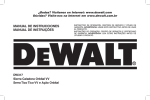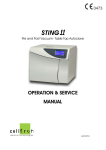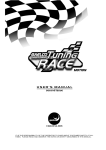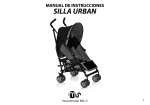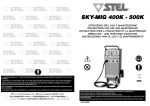Download THOR 123 - Stel Welding Division
Transcript
6934900000 - MANUALE DI ISTRUZIONE PER TAGLIO PLASMA - INSTRUCTION MANUAL FOR PLASMA CUTTING MACHINE THOR 123 Info : www.stelgroup.it - tel. +39 0444 639525 1 6934900000 DECLARATION OF CONFORMITY According to The Low Voltage Directive 2006/95/EC The EMC Directive 2004/108/EC The RoHS Directive 2011/65/EU Type of equipment Plasma equipment Type of designation 600403000L - Thor 123 Brand name or trade mark STEL Manufacturer or his authorized representatives established within the EEA: Name, address, phone, website: STEL s.r.l Via Del Progresso 59; 36020 Castegnero – Vicenza Italy Tel +39-0444-639525 Fax +39-0444-639682 www.stelgroup.it The following harmonized standard in force within the EEA has been used in the design: EN 60974-1 ed.4, Arc welding equipment – Part 1: Welding power sources EN 60974-10 ed.2, Arc welding equipment – Part 10: Electromagnetic compatibility (EMC) requirements Additional information: Restrictive use, Class A equipment, intended for use in locations other than residential. By signing this document, the undersigned declares as manufacturer, or the manufacturer’s authorized representative established within EEA, that the equipment in question complies with the safety requirements stated above. Date Signature Position 01-01-2015 Andrea Barocco General Manager 2 6934900000 SICUREZZE LO SHOCK ELETTRICO PUÒ UCCIDERE - Disconnettere la macchina dalla rete di alimentazione prima di intervenire sul generatore. - Non lavorare con i rivestimenti dei cavi deteriorati. - Non toccare le parti elettriche scoperte. - Assicurarsi che tutti i pannelli di copertura del generatore di corrente siano ben fissati al loro posto quando la macchina è collegata alla rete di alimentazione. - Isolate Voi stessi dal banco di lavoro e dal pavimento (ground): usate scarpe e guanti isolanti. - Tenete guanti, scarpe, vestiti, area di lavoro, e questa apparecchiatura puliti ed asciutti. WARNING I CONTENITORI SOTTO PRESSIONE POSSONO ESPLODERE SE SALDATI. Quando si lavora con un generatore di corrente: - non saldare contenitori sotto pressione. - non saldare in ambienti contenenti polveri o vapori esplosivi. LE RADIAZIONI GENERATE DALL’ARCO Dl SALDATURA POSSONO DANNEGGIARE GLI OCCHI E PROVOCARE BRUCIATURE ALLA PELLE. - Proteggere gli occhi ed il corpo adeguatamente. - È indispensabile per i portatori di lenti a contatto proteggersi con apposite lenti e maschere. PREVENZIONE USTIONI Per proteggere gli occhi e la pelle dalle bruciature e dai raggi ultravioletti: - portare occhiali scuri. Indossare vestiti, guanti e scarpe adeguate. - usare maschere con i lati chiusi, aventi lenti e vetri di protezione a norme (grado di protezione DIN 10). - avvisare le persone circostanti di non guardare direttamente l’arco. IL RUMORE PUÒ’ DANNEGGIARE L’UDITO. - Proteggersi adeguatamente per evitare danni. I FUMI ED I GAS POSSONO DANNEGGIARE LA VOSTRA SALUTE. - Tenere il capo fuori dalla portata dei fumi. - Provvedere per una ventilazione adeguata dell’area di lavoro. - Se la ventilazione non è sufficiente, usare un aspiratore che aspiri dal basso. IL CALORE, GLI SCHIZZI DEL METALLO FUSO E LE SCINTILLE POSSONO PROVOCARE INCENDI. - Non saldare vicino a materiali infiammabili. - Evitare di portare con sé qualsiasi tipo di combustibile come accendini o fiammiferi. - L’arco di saldatura può provocare bruciature. Tenere la punta dell’elettrodo lontano dal proprio corpo e da quello degli altri. PREVENZIONE INCENDI La saldatura produce schizzi di metallo fuso. Prendere le seguenti precauzioni per evitare incendi: - assicurarsi un estintore nell’area di saldatura. - allontanare il materiale infiammabile dalla zona immediatamente vicina all’area di saldatura. - raffreddare il materiale saldato o lasciarlo raffreddare prima di toccarlo o di metterlo a contatto con materiale combustibile - non usare mai la macchina per saldare contenitori di materiale potenzialmente infiammabile. Questi contenitori devono essere puliti completamente prima di procedere alla saldatura. - ventilare l’area potenzialmente infiammabile prima di usare la macchina. - non usare la macchina in atmosfere che contengano concentrazioni elevate di polveri, gas infiammabili o vapori combustibili. PREVENZIONE CONTRO SHOCK ELETTRICI Prendere le seguenti precauzioni quando si opera con un generatore di corrente: - tenere puliti se stessi ed i propri vestiti. - non essere a contatto con parti umide e bagnate quando si opera con il generatore. - mantenere un isolamento adeguato contro gli shock elettrici. Se l’operatore deve lavorare in ambiente umido, dovrà usare estrema cautela, vestire scarpe e guanti isolanti. - controllare spesso il cavo di alimentazione della macchina: dovrà essere privo di danni all’isolante. I CAVI SCOPERTI SONO PERICOLOSI Non usare la macchina con un cavo di alimentazione danneggiato; è necessario sostituirlo immediatamente. - se c’è la necessità di aprire la macchina, prima 3 6934900000 staccare l’alimentazione. Aspettare 5 minuti per permettere ai condensatori di scaricarsi. Non rispettare questa procedura può esporre l’operatore a pericolosi rischi di shock elettrico. - non operare mai con il generatore, se la copertura di protezione non è al suo posto. - assicurarsi che la connessione di terra del cavo di alimentazione, sia perfettamente efficiente. RECLAMI Reclami per danneggiamento durante il trasporto: Se la Vs. apparecchiatura viene danneggiata durante la spedizione, dovete inoltrare un reclamo al Vs. spedizioniere. Reclami per merce difettosa: Tutte le apparecchiature spedite da STEL sono state sottoposte ad un rigoroso controllo di qualità. Tuttavia se la Vs. apparecchiatura non dovesse funzionare correttamente, rivolgetevi al Vs. concessionario autorizzato. Questo generatore è stato progettato per essere utilizzato in ambiente professionale ed industriale. Per altri tipi di applicazione contattare il costruttore. Nel caso in cui disturbi elettromagnetici siano individuati è responsabilità dell’utilizzatore della macchina risolvere la situazione con l’assistenza tecnica del costruttore. È vietato l’utilizzo e l’avvicinamento alla macchina da parte di persone portatori di stimolatori elettrici (PACE MAKERS). DESCRIZIONE GENERALE Il generatore fornisce una corrente continua regolabile per avere le massime prestazioni di taglio. Il generatore è stato progettato con le più avanzate tecnologie per poter offrire i seguenti vantaggi: - Peso ridotto per assicurare la massima maneggevolezza. - La tecnologia ad inverter consente di ottenere un arco stabile, che assicura un’alta qualità di taglio per una grande varietà di metalli e di spessori. - L’arco pilota può perforare metalli verniciati od arrugginiti. - L’arco pilota continuo permette di tagliare facilmente materiali forati; l’arco pilota si trasferisce al pezzo da tagliare quando la torcia è circa a 3 mm. dalla superficie di taglio. - Il potenziometro di regolazione della corrente posto sul pannello frontale, imposta la corrente di taglio. - Il generatore necessita di aria compressa. L’aria usata dovrà essere priva di impurità, olio, acqua od altri prodotti inquinanti. RICEVIMENTO L’imballo contiene: - N. 1 generatore - N. 1 manuale istruzione - N. 1 cavo massa - N. 1 kit torcia - N. 1 innesto rapido Verificare che siano compresi nell’imballo tutti i materiali sopra elencati. Avvisare il Vs. distributore se manca qualcosa. Verificare che il generatore non sia stato danneggiato durante il trasporto. Se vi è un danno evidente, vedere la sezione RECLAMI per istruzioni. Prima di operare con il generatore leggere attentamente questo manuale di istruzioni. DATI TECNICI A C D B A) IDENTIFICAZIONE Nome, indirizzo del costruttore Tipo generatore Identificazione riferita al numero di serie Simbolo del tipo di generatore Riferimento alla normativa di costruzione B) DATI DI SALDATURA Simbolo del processo di lavoro Simbolo per generatori idonei ad operare in ambiente a rischio accresciuto di scossa elettrica. Simbolo della corrente Tensione assegnata a vuoto (tensione media) Gamma della corrente Valori del ciclo di intermittenza (su 10 minuti) Valori della corrente assegnata Valori della tensione convenzionale a carico C) ALIMENTAZIONE Simbolo per l’alimentazione (numero fasi e frequenza) Tensione assegnata di alimentazione Massima corrente di alimentazione Massima corrente efficace di alimentazione (identifica il fusibile di linea) D) ALTRE CARATTERISTICHE 4 6934900000 Grado di protezione. INSTALLAZIONE ATTENZIONE: Questa apparecchiatura in CLASSE A non e’ destinata all’uso in ambienti residenziali dove la potenza elettrica e’ fornita dal sistema pubblico di alimentazione a bassa tensione. Ci possono essere potenziali difficoltà a garantire la compatibilità elettromagnetica di questi ambienti a causa di disturbi condotti e irradiati. Il generatore THOR 123 non rispetta i limiti della IEC 61000-312. Se collegato alla rete BT industriale pubblica è responsabilità dell'installatore o dell'utilizzatore assicurarsi, previa consultazione dell'Ente distributore, se lo stesso è collegabile. Il generatore THOR 123 S rispetta i limiti della IEC 61000-3-12 e puo’ essere collegato alla rete BT industriale pubblica e privata. Il buon funzionamento del generatore è assicurato da un’ adeguata installazione; è necessario quindi: - Sistemare la macchina in modo che non sia compromessa la circolazione d’ aria assicurata dal ventilatore interno . - Evitare che i ventilatori immettano nella macchina depositi o polveri. - E’ bene evitare urti, sfregamenti, ed in maniera assoluta l’ esposizione a stillicidi, fonti di calore eccessive, o comunque situazioni anomale. TENSIONE DI RETE Il generatore funziona con queste tensione di alimentazione: THOR 123 400V +/- 15% e Fuse rating di 25A COLLEGAMENTO - Prima di effettuare connessioni elettriche tra il generatore di corrente e l’ interruttore di linea, accertarsi che quest’ ultimo sia aperto. - Il quadro di distribuzione deve essere conforme alle normative vigenti nel paese di utilizzo. -L’ impianto di rete deve essere di tipo industriale. -Predisporre una apposita spina che preveda l’alloggiamento dei conduttori del cavo di alimentazione. -Per i cavi più lunghi maggiorare opportunamente la sezione del conduttore. -A monte, l’apposita presa di rete dovrà avere un adeguato interruttore munito di fusibili ritardati. l’ apparecchiatura può provocare shock elettrici pericolosi per l’utente, e un non corretto funzionamento del generatore. ALLACCIAMENTO CIRCUITO PNEUMATICO: Il THOR 123/123S usa aria compressa come gas per il plasma. Può essere usata quindi qualsiasi bombola di aria compressa oppure aria proveniente da un compressore. L’aria dovrà essere libera da particelle inquinanti, come olio, acqua o altri agenti contaminanti. Un regolatore di pressione è previsto per avere la corretta portata d’aria sulla torcia. CIRCUITO ARIA: vedere figura LEGENDA: 1– Filtro aria 2– Riduttore (regolatore pressione) 3– Manometro 4-- Pressostato 5– Elettrovalvola Si dovrà applicare una pressione più alta di 5 bar (55,5 bar) e portata minima di 130l/min al filtro aria posto sul pannello posteriore del THOR 123. La pressione non dovrà superare i 6 bar. Il regolatore di pressione 2 è impostato dalla ditta costruttrice a 4,8 bar. Controllare la pressione premendo il pulsante di Test aria posto sul pannello anteriore e verificare sul manometro 4,8 bar. Se si verificasse la necessità di regolare la pressione, riferirsi alla procedura di regolazione nella sezione RICERCA GUASTI. Si dovrà avere cura dei tubi di collegamento pneumatico perché eventuali strozzature dei tubi o eccessive lunghezze possono creare inconvenienti durante il processo di taglio. Il pressostato inibisce il funzionamento del generatore per pressione dell’ aria inferiore a 3 bar in quanto è insufficiente a garantire il corretto funzionamento in taglio. MESSA A TERRA - Per la protezione degli utenti il generatore dovrà essere assolutamente collegato correttamente all’impianto di terra (NORMATIVE INTERNAZIONALI DI SICUREZZA). - E’ indispensabile predisporre una buona messa a terra tramite il conduttore giallo-verde del cavo di alimentazione, onde evitare scariche dovute a contatti accidentali con oggetti messi a terra. Lo chassis (che è conduttivo) è connesso elettricamente con il conduttore di terra; non collegare correttamente a terra 5 6934900000 SOLLEVAMENTO ATTENZIONE: THOR 123 peso 50kg / 110lbs DESCRIZIONE PANNELLO FRONTALE - THOR 123 Sollevamento manuale Per sollevare manualmente il generatore servirsi delle due apposite maniglie. Sollevamento tramite gancio e cinghia Per il sollevamento con gancio e cinghia usare esclusivamente i le maniglie come indicato nel disegno. Durante il sollevamento tenere il generatore in posizione orizzontale. 1 2 3 4 5 6 7 8 9 10 Led presenza aria Led allarme protezione Pulsante test aria Led sovratemperatura Led abilitazione taglio Led macchina sotto tensione Display Corrente Pulsante RESET Interruttore ON-OFF Encoder regolazione corrente MESSA IN OPERA AVVERTENZA POSIZIONAMENTO PRECARIO Se il generatore cade può causare infortuni. Non mettere in funzione o spostare il generatore nel caso si trovi in posizione precaria. Non posizionare il generatore su piani inclinati superiori a 10°. L’operatore addetto durante l’utilizzo della macchina deve obbligatoriamente porsi nel lato anteriore della stessa onde evitare che i fumi prodotti dal taglio vengano aspirati (Attraverso le aperture di aerazione frontali e laterali) all’interno della macchina dai ventilatori di raffreddamento. Fare riferimento per le istruzioni di seguito riportate alla figura 1: - Con il potenziometro di regolazione della corrente di uscita (10), impostare un valore adeguato allo spessore da tagliare ed in accordo con la portata della linea. - Commutare l’interruttore posto nel pannello anteriore (9). - si accenderà il Led verde (6) (macchina sotto tensione). - si accenderà il Led verde (1) ad indicare la presenza di aria compressa nel circuito aria. - Il Led rosso (2) è acceso; ATTENZIONE premere il pulsante RESET(8) -Il Led rosso si spegne (2) -Il Led giallo (4) spento significa che la temperatura di funzionamento del generatore è nei valori normali. -Con il pulsante TEST GAS (3) verificare che la pressione dell’aria compressa sia impostata correttamente. 6 6934900000 - Collegare il cavo positivo (Cavo Massa) saldamente al pezzo da tagliare. (N.B: non attaccare la pinza alla parte di materiale che verrà staccata con il taglio). - Il generatore è ora pronto per lavorare. Quando si vuole iniziare, posizionare la torcia sul pezzo da tagliare e premere il pulsante posto sulla torcia stessa. - Ora l’arco viene trasferito al pezzo da tagliare. Muovere la torcia secondo la direzione desiderata con una velocità che assicuri una buona qualità di taglio. - Quando il taglio è terminato, rilasciare il pulsante torcia per spegnere l’arco; si avrà uscita dell’aria per 15” per poter raffreddare le parti della torcia. CONSIGLI DI TAGLIO: - Non innescare l’arco pilota in aria se non c’è la necessità. Questo provoca una sensibile riduzione della durata dell’ugello. - Partire con il taglio dal bordo del pezzo da tagliare finché non si riesce a perforarlo. - Verificare che durante il taglio i lapilli escano dalla parte inferiore del pezzo. Se escono dalla parte superiore vuol dire che si sta muovendo la torcia troppo velocemente o che non si ha la potenza necessaria per forare il pezzo. - Tenere la torcia in posizione verticale ed osservare l’arco lungo la linea di taglio. Trascinando leggermente la torcia sul pezzo, si può mantenere un taglio regolare. - Quando si tagliano materiali sottili, ridurre la potenza fino ad avere la migliore qualità di taglio. CONSIGLI PER LA PERFORAZIONE: - Tenere la torcia circa ad 1 mm. di distanza dal pezzo da tagliare prima di premere il pulsante torcia. Si allunga così la vita dell’ugello. - Iniziare il taglio con un piccolo angolo piuttosto che con una posizione verticale della torcia. Questo permette al metallo fuso di uscire da un lato piuttosto che schizzare indietro verso l’ugello, proteggendo così l’operatore dai lapilli ed aumentando la vita dell’ugello stesso. - Impugnare la torcia rivolta lontano dal proprio corpo e lentamente portarla in posizione verticale. (Importante quando si tagliano spessori sottili). Assicurarsi che la torcia sia puntata lontano da Voi e dalle persone attorno a Voi per evitare danni provocati da lapilli di metallo fuso. - Quando il foro è completato procedere col taglio. MALFUNZIONAMENTI COMUNI DURANTE IL TAGLIO: Il pezzo non è completamente forato. Le cause possono essere: - La corrente è troppo bassa. - La velocità di taglio è troppo alta. - I componenti della torcia sono consumati. - Il pezzo da tagliare ha uno spessore troppo grosso. Presenza di materiali di scarto sul fondo del taglio. Le cause possono essere: - La velocità di taglio è troppo bassa. - I componenti della torcia sono consumati. - La corrente è troppo alta. TAGLIO A CONTATTO Questo tipo di taglio si usa per materiali di spessore 5mm o inferiori. - Togliere il distanziale e il TIP da 60A. Predisporre la torcia montando i consumabili per il taglio a contatto: Tip 40A e Deflector . - Regolare la corrente dal minimo fino a 40A (max). Procedere con il traglio restando a contatto con il pezzo da tagliare. Deflector cod 6074400000 Tip 40A cod 6073800000 MESSA FUORI SERVIZIO L’operatore addetto dopo aver eseguito il taglio può mettere fuori servizio (spegnere) la macchina rispettando le seguenti fasi (fare riferimento alla figura 1): 1-Spegnere la macchina portando l’interruttore di linea (9) in posizione “0“. 2-Controllare che i Led macchina sotto tensione (6) e presenza aria (1) siano spenti. 3-Togliere la spina di connessione della macchina alla presa di alimentazione elettrica. 4- Scollegare il cavo dal connettore positivo (Pinza di Massa) PULIZIA INTERNA DELLA MACCHINA Prima di eseguire la pulizia interna della macchina è obbligatorio rispettare le avvertenze sopra descritte e procedere secondo le seguenti fasi: 1- Togliere la capotta svitando le apposite viti laterali; 2- Togliere ogni traccia di polvere dalle parti interne della macchina mediante getto d’aria compressa con pressione non superiore a 3 bar; 3- Controllare visivamente tutte le connessioni elettriche, assicurandosi che viti e dadi siano ben serrati; 4- Controllare visivamente lo stato di tutti i componenti: sostituire eventuali componenti deteriorati; 5- Rimontare la capotta avvitando le apposite viti laterali. MANUTENZIONE PREVENTIVA Ispezionare saltuariamente (ogni 3-4 mesi) l’interno del generatore, togliendo i depositi di polvere sugli organi interni affinché non venga compromesso il loro raffreddamento e funzionamento. La frequenza di tale operazione è in funzione della posizione della macchina e della quantità di polvere e depositi presenti nell’atmosfera di lavoro. Controllare spesso che i 7 6934900000 cablaggi e le connessioni di potenza siano ben fissati. RICAMBIO PARTI CONSUMATE Attenzione! L’ugello della torcia e le parti limitrofe raggiungono temperature elevate durante l’uso, per evitare pericolo di ustioni attendere il raffreddamento prima di effettuare operazioni di manutenzione. Saltuariamente, o in caso si notino delle anomalie di funzionamento, ispezionare l’ugello della torcia per vedere se vi sono stati danneggiamenti. Se il foro dell’ugello è deteriorato o di aspetto ovale, è tempo di sostituire le parti di ricambio. Ispezionare l’elettrodo: se il centro dell’elettrodo ha una cavità con una profondità maggiore di 1,5 mm sostituirlo. Sostituire parti della torcia non richiede attrezzature particolari. parti della torcia non richiede attrezzature particolari. Basta svitare il cappuccio di ritenuta e tutte le parti componenti la torcia sono facilmente sostituibili. Quando si svita il cappuccio di ritenuta si sente un piccolo click dovuto ad un microswitch che disabilita la macchina per evitare partenze accidentali . Una volta risistemata la torcia, per iniziare a lavorare si deve premere il pulsante di RESET. INTERVENTI La presente sezione descrive le procedure essenziali di manutenzione che possono essere eseguite dall’operatore. Altre regolazioni o riparazioni dovranno essere effettuate unicamente da personale opportunamente addestrato. AVVERTENZE Scollegare l’alimentazione principale alla fonte prima di smontare la torcia o i conduttori della torcia. Rileggere spesso le precauzioni importanti in materia di sicurezza riportate all’inizio del presente manuale. Accertarsi che l’operatore sia provvisto di guanti, indumenti, occhiali e protezioni per le orecchie adeguati. Sincerarsi che nessuna parte del corpo dell’operatore entri in contatto con il pezzo lavorato quando la torcia viene azionata. ATTENZIONE Le scintille provocate dal processo di taglio possono causare danni a superfici rivestite, verniciate o altre come vetro, plastica e metallo. MANUTENZIONE DELLA TORCIA A. Pulizia della torcia Anche se si adottano precauzioni per utilizzare soltanto aria pulita con la torcia, è possibile che all’interno della torcia si accumulino residui. Tali accumuli possono influire sull’accensione dell’arco pilota e sulla qualità complessiva del taglio eseguito con la torcia. AVVERTENZE Scollegare l’alimentazione principale dal sistema prima di smontare la torcia o i conduttori della torcia. NON toccare alcun componente interno della torcia quando la spia di segnalazione dell’alimentatore è accesa . Pulire l’interno della torcia con un detergente per contatti elettrici utilizzando un batuffolo di ovatta o un panno umido morbido. Nei casi più gravi, la torcia può essere scollegata dai conduttori e pulita più accuratamente versando un detergente per contatti elettrici all’interno della torcia e soffiando al suo interno aria compressa. ATTENZIONE Asciugare accuratamente la rimontarla. torcia prima di MALFUNZIONAMENTI COMUNI Di seguito vengono elencati i malfunzionamenti più comuni in fase di taglio con le possibili cause. 1. Penetrazione insufficiente a. Velocità di taglio troppo alta b. Inclinazione eccessiva della torcia c. Spessore eccessivo del metallo d. Componenti della torcia usurati e. Corrente di taglio troppo bassa f. Componenti non originali della thermal dynamics 2. Spegnimento dell’arco principale a. Velocità di taglio troppo bassa b. Eccessiva distanza tra torcia e pezzo lavorato c. Corrente di taglio troppo alta d. Cavo di lavoro scollegato e. Componenti della torcia usurati f. Componenti non originali della thermal dynamics 3. Formazione eccessiva di scorie a. Velocità di taglio troppo bassa b. Eccessiva distanza tra torcia e pezzo lavorato c. Componenti della torcia usurati d. Corrente di taglio inadeguata e. Componenti non originali della thermal dynamics 4. Breve durata dei componenti della torcia a. Olio o umidità nella fonte di aria b. Superamento della capacità del sistema (materiale troppo spesso) c. Tempo eccessivo dell’arco pilota d. Flusso di aria troppo basso (pressione non corretta) e. Componenti non originali della thermal dynamics 8 6934900000 Sostituirla ove del caso. ISPEZIONE E SOSTITUZIONE DEI COMPONENTI USURATI NELLA TORCIA AVVERTENZE Scollegare l’alimentazione principale dal sistema prima di smontare la torcia o i conduttori della torcia. NON toccare alcun componente interno della torcia quando la spia di segnalazione dell’alimentatore è accesa. Smontare i componenti soggetti a usura della torcia come segue: NOTA La shield cup trattiene in posizione la punta e la cartuccia di start. Posizionare la torcia con la shield cup rivolta verso l’alto per evitare che i componenti cadano quando si rimuove la shield cup. 1. Svitare e smontare la shield cup dalla torcia. NOTA L’accumulo di scorie sulla shield cup che non si riesce a rimuovere può influire sulle prestazioni del sistema. 2. Verificare che la shield cup non presenti danni. Pulirla con un panno o sostituirla nel caso in cui sia danneggiata. 5. Estrarre l’elettrodo direttamente dal corpo torcia. Verificare che la faccia dell’elettrodo non presenti un’usura eccessiva facendo riferimento alle figure di seguito. 6. Rimontare l’elettrodo spingendolo direttamente nel corpo torcia finché non scatta in posizione. 7. Rimontare la cartuccia di start e la punta desiderate nel corpo torcia. 8. Serrare manualmente la shield cup finché non è alloggiata nel corpo torcia. Se si percepisce una certa resistenza nel momento in cui si monta la shield cup, prima di procedere verificare le lettature. GUIDA ALLA RISOLUZIONE DEI GUASTI Questa sottosezione descrive come procedere alla risoluzione dei guasti nel caso in cui occorra smontare la torcia ed eseguire misurazioni elettroniche. Tali procedure sono utili per risolvere molti problemi comuni che possono manifestarsi con questo tipo di torcia. Componenti soggetti a usura 3. Smontare la Tip. Verificare che non presenti un’usura eccessiva (segnalata da un orifizio allungato o sovradimensionato). Pulire o sostituire la tip ove del caso. 4. Smontare la cartuccia di start. Verificare che non presenti un’usura eccessiva, fori del gas ostruiti o scolorimenti. Accertarsi che il raccordo all’estremità inferiore si muova liberamente. COME UTILIZZARE LA GUIDA Le informazioni fornite di seguito intendono aiutare il cliente/l’operatore a stabilire le cause più probabili di vari sintomi. La guida è strutturata come segue: X. Sintomo (in grassetto) Eventuali istruzioni particolari (in testo normale) 1. Causa (in corsivo) a. Controllo/soluzione (in testo sottolineato) Individuare il sintomo, consultare le cause (le cause sono elencate partendo dalle più frequenti), quindi le soluzioni. Effettuare le riparazioni del caso ricordandosi di controllare che l’aggancio sia perfettamente funzionante dopo gli eventuali interventi eseguiti. 9 6934900000 Risoluzione dei guasti: A. La fiamma pilota della torcia non si accende quando si attiva l’interruttore della torcia 1. Led rosso reset sempre acceso a. Verificare che la shield cup sia montata in maniera corretta. 2. O-ring superiore sulla testa della torcia in posizione non corretta a. Smontare la shield cup dalla torcia; verificare la posizione dell’O-ring superiore. Correggerla ove del caso. 3.Interruttore della torcia o sicurezza torcia malfunzionante a. Verificare la continuità dell’interruttore della torcia e della sicurezza torcia. 2. Shield cup non montata correttamente. sulla torcia a. Verificare che la shield cup sia perfettamente alloggiata contro la testa della torcia (non stringere eccessivamente). 3. Protezione sicurezza torcia o malfunzionamento dell’ interruttore della torcia a. Verificare che la shield cup sia montata correttamente. b. Controllare la continuità dell’interruttore nell’impugnatura della torcia manuale o nel corpo della torcia se installata su una macchina. 4. Componenti malfunzionanti nel gruppo torcia e cavo torcia a. Ispezionare i gruppi della torcia e sostituirli ove del caso. 5. Componenti malfunzionanti nel generatore a. Restituire per la riparazione o richiedere un intervento di assistenza da parte di un tecnico qualificato conformemente al Manuale di assistenza. C. Potenza limitata senza alcun controllo 1. Collegamenti di entrata o uscita all’generatore inadeguati a. Verificare tutti i collegamenti di entrata e uscita. 2. Componenti malfunzionanti nel gruppo torcia e cavo torcia a. Ispezionare i componenti della torcia e sostituirli ove del caso. 4. Componenti della torcia malfunzionanti a. Ispezionare i componenti della torcia e sostituirli ove del caso. Consultare la Sezione 10.9, Ispezione e sostituzione dei componenti soggetti a usura della torcia. 3. Componenti malfunzionanti nel generatore a. Restituire per la riparazione o richiedere un intervento di assistenza da parte di un tecnico qualificato conformemente al Manuale di assistenza. 5. Pressione del gas troppo bassa a. Impostare la pressione operativa del gas corretta. D. Taglio irregolare o non corretto 1. Collegamenti di entrata o uscita al generatore inadeguati a. Verificare tutti i collegamenti di entrata e uscita. 6. Componenti malfunzionanti nel gruppo torcia e conduttori a. Ispezionare i gruppi della torcia e sostituirli ove del caso. 7. Componenti malfunzionanti nell’impianto a. Restituire per la riparazione o richiedere un intervento di assistenza da parte di un tecnico qualificato conformemente al Manuale di assistenza. B. La torcia non taglia 1. Torcia non collegata correttamente all’alimentatore a. Verificare che il cavo torcia sia correttamente collegato all’alimentatore. 2. Corrente impostata troppo bassa sul generatore a. Aumentare l’impostazione della corrente. 3. Torcia spostata troppo rapidamente sul pezzo lavorato a. Ridurre la velocità di taglio 4.Olio o umidità eccessiva nella torcia a. Tenere la torcia a 3,2 mm da una superficie pulita durante lo spurgo e osservare se è presente una formazione di olio o umidità (non azionare la torcia). E. Assenza del flusso di gas 1. Gas non collegato o pressione troppo bassa 10 6934900000 a. Verificare la fonte per accertarsi che la pressione operativa del gas sia corretta 2. Componenti malfunzionanti nella torcia e conduttori a. Ispezionare i componenti della torcia e sostituirli ove necessario. ALLARME PULSANTE Il led (2) è acceso e lampeggia velocemente e il display visualizza "TRI". 3. Componenti malfunzionanti nell’alimentatore a. Restituire per la riparazione o richiedere un intervento di assistenza da parte di un tecnico qualificato conformemente al Manuale di assistenza. F. Taglio eseguito, ma inadeguato 1. Corrente impostata troppo bassa sul generatore a. Aumentare l’impostazione della corrente. 2. Torcia spostata troppo rapidamente sul pezzo lavorato a. Ridurre la velocità di taglio 3. Olio o umidità eccessiva nella torcia a. Tenere la torcia a 3,2 mm da una superficie pulita durante lo spurgo e osservare se è presente una formazione di olio o umidità (non azionare la torcia). DIFETTI 1. L’operatore accende il generatore con il pulsante torcia premuto. 2. Il generatore è bloccato. 3. Spegnere il generatore e controllare la torcia. Vedere la sezione SERVICE. PIP (PART IN PLACE) In questa sezione vengono descritti I più comuni malfunzionamenti e come vengono indicati Il led (2) è acceso , lampeggia lentamente e il display visualizza "PIP". MANCANZA ARIA Il led (1) di presenza aria si spegnerà. 1. I consumabili non sono montati correttamente. 2. Il generatore è bloccato. 1. No aria nel sistema 3. Spegnere consumabili . 2. Controllare il flusso d’aria Controllare che il tubo dell’aria sia correttamente collegato al regolatore ,posto sul retro del generatore , e che la pressione sia corretta. (vedi INSTALLAZIONE PNEUMATICO ) - il generatore e controllare I Vedere la sezione SERVICE. CIRCUITO 11 6934900000 RESET Il led (2) è acceso senza lampeggiare e il display visualizza l’amperaggio. DUTY CYCLE E SOVRATEMPERATURA Il led 3 è acceso e il display visualizza HT (1,3,5,7) 1. Il generatore è semplicemente in STAND-BY. 2. Premere il pulsante RESET (7). Vedere la sezione STATING UP Il ciclo di intermittenza è la percentuale di utilizzo della saldatrice su 10 minuti che l’ operatore deve rispettare per evitare che scatti il blocco di erogazione per sovratemperatura. Se la macchina entra in sovratemperatura: - Il led giallo si accende in modo intermittente . - E’ necessario attendere circa 10 minuti per riprendere a saldare. SMALTIMENTO APPARECCHIATURE ELETTRICHE ED ELETTRONICHE Non smaltire le apparecchiature elettriche assieme ai rifiuti normali! In ottemperanza alla Direttiva Europea 2002/96/CE sui rifiuti da apparecchiature elettriche ed elettroniche e relativa attuazione nell'ambito della legislazione nazionale, le apparecchiature elettriche giunte a fine vita devono essere raccolte separatamente e conferite ad un impianto di riciclo ecocompatibile. In qualità di proprietario delle apparecchiature dovrà informarsi presso il nostro rappresentante in loco sui sistemi IN CASO DI CATTIVO FUNZIONAMENTO RICHIEDETE L’ASSISTENZA DI PERSONALE QUALIFICATO. 12 6934900000 SAFETY ELECTRIC SHOCK CAN KILL - Disconnect the power supply before working on the welding machine. - Do not work with deteriorated cable sheaths. - Do not touch bare electrical parts. - Ensure that all the panels covering the welding machine are firmly secured in place when the machine is connected to the mains supply. - Insulate yourself from the work bench and from the floor (ground): use insulating footwear and gloves. - Keep gloves, footwear, clothes, the work area and this equipment clean and dry. PRESSURISED CONTAINERS CAN EXPLODE IF WELDED. When working with a welding machine: - do not weld pressurised containers . - do not weld in environments containing explosive powders or vapours. THE RADIATIONS GENERATED BY THE WELDING ARC CAN DAMAGE THE EYES AND CAUSE BURNING OF THE SKIN. - Provide suitable protection for the eyes and body. - It is indispensable for contact lens wearers to protect themselves with suitable lenses and masks. environment, he must take extreme care and wear insulating footwear and gloves. - check the machine power cable frequently: it must be free from damage to the insulation. BARE CABLES ARE DANGEROUS. Do not use the machine if the power cable is damaged; it must be replaced immediately. - if it is necessary to open the machine, first disconnect the power supply. Wait 5 minutes to allow the capacitors to discharge. Failure to take this precaution may expose the operator to dangerous risks of electric shock. - never work with the welding machine if the protective cover is not in place. - ensure that the earth connection of the power supply cable is perfectly efficient. This machine has been designed for use in a professional and industrial environment. For other types of application contact the manufacturer. If electromagnetic disturbances are found it is the responsibility of the machine user to solve the problem with the technical assistance of the manufacturer. It is forbidden for people with PACEMAKERS to use or come near the machine. WARNING NOISE CAN DAMAGE YOUR HEARING. - Protect yourself suitably to avoid hearing damage. FUMES AND GASES CAN DAMAGE YOUR HEALTH. - Keep your head out of the reach of fumes. - Provide suitable ventilation of the work area. - If the ventilation is not sufficient, use an exhaust system that sucks from the bottom. HEAT, SPLASHES OF MOLTEN METAL AND SPARKS CAN CAUSE FIRES. - Do not weld near inflammable materials. - Avoid having any type of fuel with you such as cigarette lighters or matches. - The welding arc can cause burns. Keep the tip of the electrode far from your body and from other persons. PREVENTION OF ELECTRIC SHOCKS Take the following precautions when working with a welding machine: - keep yourself and your clothes clean. - do not be in contact with damp or wet parts when working with the welding machine. - maintain suitable insulation against electric shock. If the operator has to work in a damp PREVENTION OF BURNS To protect your eyes and skin from burns and ultraviolet rays: - wear dark glasses. Wear suitable clothing, gloves and footwear. - use masks with closed sides, having lenses and protective glass according to standards (degree of protection DIN 10). - warn people in the vicinity not to look directly at the arc. PREVENTION OF FIRE Welding produces splashes of molten metal. 13 6934900000 Take the following precautions to prevent fire: - ensure that there is a fire extinguisher in the welding area. - remove all inflammable material from the immediate vicinity of the welding area. - cool the welded material or let it cool before touching it or putting it in contact with combustible material - never use the machine for welding containers of potentially inflammable material. These containers must be completely cleaned before they are welded. - ventilate the potentially inflammable area before using the machine. - do not use the machine in atmospheres containing high concentrations of powders, inflammable gases or combustible vapours. GENERAL CHARACTERISTICS The Inverter power source supplies adjustable continuous current to provide maximum cutting performance. The Inverter has been designed with the latest advanced technology available, providing the following advantages: - Low weight to allow maximum ease of handling. - The inverter technology allows a stable arc to be obtained, which ensures high cutting quality for a great variety of metals and thicknesses. - The pilot arc can perforate painted or rusty metals. - The continuous pilot arc allows easy cutting of perforated materials; the pilot arc is transferred to the piece that is to be cut when the torch is about 3 mm. away from the cutting surface. - The regulating potentiometer, positioned on the front panel, sets the cutting current of the machine. - The Inverter operates with compressed air . The air used must be free from impurities, oil or other polluting substances. DELIVERY OF THE MATERIAL The package contains: - N. 1 Inverter - N. 1 instructions manual - N. 1 torch - N. 1 earth cable - N. 1 air connection Check that all the material listed above is included in the package. Inform your distributor if anything is missing. Check that the Inverter has not been damaged in transport. If you see any sign of damage, consult the COMPLAINTS section for instructions. Before working with a THOR Plasma Inverter, read the SAFETY and USE section of this manual. COMPLAINTS Complaints for damage during transport: If your equipment is damaged during transit you must present a claim to the carrier. Complaints for faulty goods: All the equipment shipped by STEL is subjected to strict quality control. However, if your equipment does not work properly, consult your authorise dealer. TECHNICAL DATA A B C D a) IDENTIFICATION Name, address of the manufacturer Type of Plasma machine Identification with reference to serial number Symbol of the type of Plasma machine Reference to the construction standards b) WELDING OUTPUT Symbol of the work process Symbol for Plasma machines suitable for working in an environment with a high risk of electric shock. Symbol of the cutting current Assigned no-load voltage (mean voltage) Range of the welding current Values of the intermittent cycle (in 10 minutes) Values of the assigned cutting current Values of the conventional loaded voltage c) POWER SUPPLY Power supply symbol (number of phases and frequency) Assigned power supply voltage Maximum power supply current Maximum effective power supply current (identifies the line fuse) d) OTHER CHARACTERISTICS Degree of protection . 14 6934900000 and those nearby. INSTALLATION WARNING: This Class A equipment is not intended for use in residential locations where the electrical power is provided by the public lowvoltage supply system. There may be potential difficulties in ensuring electromagnetic compatibility in those locations, due to conducted as well as radiated disturbances. This equipment does not comply with IEC 610003-12. If it is connected to a public low voltage system, it is the responsibility of the installer or user of the equipment to ensure, by consultation with the distribution network operator if necessary, that the equipment may be connected. The good operation of the machine is ensured by correct installation; you must therefore proceed as follows: - Position the machine in such a way that there is no obstacle to the air circulation ensured by the internal fan since the internal components require suitable cooling. - Ensure that the fan does not send deposits or dust into the machine. - Avoid impacts, rubbing, and absolutely no exposure to dripping water, excessive heat sources, or any abnormal situations. MAINS VOLTAGE The Inverter operates from a mains voltage supply: THOR 123 400V +/- 15% and Fuse rating di 25A CONNECTION - Before making the electrical connections between the Inverter and the line switch, ensure that the switch is turned off . - The distribution panel must comply with the regulations in force in the country of use. - The mains system must be of the industrial type. - When using long extension cables, the core diameter section is increased as required for optimum performance. - The power input supply socket must have a suitable switch provided with #slow burning' type fuse(s). - In the event of damage to the power cable, replacement or repair must be performed by a qualified person at an approved service centre. PNEUMATIC CIRCUIT CONNECTION: The THOR uses compressed air for plasma cutting. Any cylinder of compressed air may therefore be used, or air from a compressor. The air must be free from polluting particles, such as oil or other contaminating agents. A pressure regulator is provided to ensure the correct air flow rate on the torch. KEY: 1– Air filter 2– Reducer (pressure regulator) 3– Pressure gauge 4– Pressure switch 5– Solenoid valves A pressure higher than 5 bar (5-5.5 bar) must be applied to the air filter located on the rear panel of the THOR (100l/min). The pressure must not exceed 6 bar. The pressure regulator 1 is set by the manufacturer at 4.8 bar. Check the pressure by pressing the Air Test button on the front panel and check that the pressure gauge gives a reading of 4.8 bar. If it should be necessary to regulate the pressure, refer to the regulating procedure in the TROUBLE SHOOTING section. Pay particular attention to the pneumatic connection cables. Any blockage of the tubes or excessive lengths may cause problems during the cutting process. A pressure switch set at 3 bar inhibits operation when the pressure at output of the reducer is insufficient to guarantee operation. EARTHING - To ensure user protection the Inverter must by law be correctly connected to the earth system (INTERNATIONAL SAFETY REGULATIONS). - It is indispensable to provide good earthing by means of the yellow-green wire in the power cable, in order to avoid discharges due to accidental contacts with earthed objects . - The chassis (which is conductive) is electrically connected with the earth wire; if the equipment is not suitably connected to earth it may cause electric shocks which are dangerous to the user 15 6934900000 LIFTING WARNING: THOR 123 peso 50kg / 110lbs FRONT PANEL DESCRIPTION - THOR 123 Lifting by hand: Lift the machine using the two handles provided. Lifting with hoist and strap Lift the machine by using ONLY both handles as shown on the picture. Keep the machine as horizontal as possible 1 2 3 4 5 6 7 8 9 10 Air presence led Protection alarm led Air test button Excess temperature led Enable cutting led Machine live led Current display RESET button ON-OFF switch Cutting current regulation STARTING UP INSTRUCTION FOR INSECURE POSITIONING Failure to properly secure the machine can cause personal injury. If machine is in an insecure position do not attempt to switch on. Do not put the machine on an unlevelled surface greater than 10°. The operator may start up the machine only after having read and understood all parts of this manual. Depending on the type of cut to be performed he must follow the work phases described below. 1- Ensure that the work environment and your clothing satisfy the safety requirements described. 2- Position the Inverter in a place where there is no obstruction to air circulation. 3- Connect the THOR to a suitable power socket (an earthed socket is obligatory). 4- Connect the compressed air pipe to the air filter on the rear panel. 5- Ensure that there is no water in the filter. If necessary, empty the filter. For the instructions below, refer to the details : - With the potentiometer for regulating the output current (10), set a suitable value for the thickness that is to be cut, in agreement with the line capacity. - Turn the switch on the front panel (9). - the green led (6) will light up (machine live). - the green led (1) will light up to indicate the presence of compressed air in the air circuit. - The red Led (2) is illuminated. ATTENTION press the RESET button (8) 16 6934900000 - The red Led (2) switches off - When the yellow Led (4) is off it means that the THOR working temperature is within normal values. - With the TEST GAS button (3) check that the pressure of the compressed air has been correctly set. - Connect the positive cable (Earth Clamp) firmly to the piece to be cut. (N.B.: do not attach the clamp to the part of material that will be cut off). - The Inverter is now ready for work. When you want to start, position the torch on the work-piece to be cut and press the button on the torch. - Now the arc is transferred to the work-piece to be cut. Move the torch in the desired direction at a speed that ensures a good cutting quality. -When the cut is finished, release the torch button to stop the arc; air will continue to flow out for 15 seconds to cool the torch parts. CUTTING: -Do not freely or unnecessarily ignite the pilot arc when not cutting! This action considerably reduces the life of the nozzle. -Start cutting from the edge of the work- piece, until you manage a perforation. -Ensure that, during cutting, the sparks fall away from the bottom of the work-piece. If sparks or dross come out at the top it means that the torch is being moved too fast or that there is not the necessary power to perforate the work-piece. -Keep the torch in a vertical position and observe the arc along the cutting line. By dragging the torch lightly on the work-piece you can keep the cut regular. -When cutting thin materials, reduce the power to give optimum cutting quality. PIERCING: - Hold the torch at a distance of approximately 1 mm. from the work-piece before pressing the torch button. This distance will prolong the life of the nozzle and other parts. - Start cutting at a slight angle rather than with the torch in a vertical position. This allows the molten material to come out at one side instead of spitting back towards the nozzle, thus protecting the operator against sparks and increasing the life of the nozzle. - Hold the torch facing away from your body and bring it slowly into the vertical position. (This is important when cutting thick gauges). Ensure that the torch is pointed away from you and from anyone else in the vicinity, to avoid damage caused by sparks of molten metal. - When the pierced hole has been completed, carry on with cutting. COMMON MALFUNCTIONS DURING CUTTING: The work-piece is not completely perforated. The causes may be: − The current is too low. − The cutting speed is too fast. − The torch components are worn. − Incorrect torch angle - The piece to be cut is too thick. Presence of waste material on the bottom of the cut. The causes may be: − The cutting speed is too low − Insufficient cutting current − Incorrect torch angle − The cutting current is too high − Torch components are worn. − Travel speed is too slow CONTACT CUTTING This type of cut is used for materials with thickness 5mm or less. - Remove the spacer and the 60A TIP. Prepare the torch, fitting the consumable parts for contact cutting: Tip 40A and Deflector. - Regulate the current from minimum up to 40A (max). - Make the cut, remaining in contact with the workpiece to be cut. Deflector cod 6074400000 Tip 40A cod 6073800000 SWITCHING OFF After having made the cut, the operator may switch off the machine as follows : 1- Switch off the machine turning the line switch (9) to position “0“. 2- Check that the machine live Led (6) and the air presence Led (1) are off. 3- Disconnect the plug of the machine from the power socket. 4- Disconnect the cable from the connector (earth clamp). CLEANING THE INSIDE OF THE MACHINE: ALWAYS DISCONNECT INPUT PRIMARY SUPPLY!!! Before cleaning the inside of the machine it is obligatory to FIRST follow the WARNINGS described above and to proceed as follows: 1- Remove the casing, slackening the side screws; 2- Remove all traces of dust from the internal parts of the machine by means of a jet of compressed air at a pressure no higher than 3 Kg/cm2; 3- Visually check all the electrical connections, ensuring that the screws and nuts are well secured; 4- Visually check the state of all the components: replace any deteriorated components; 5- Put back the casing, tightening the side screws. 17 6934900000 PREVENTIVE MAINTENANCE OF POWER SOURCE. ALWAYS DISCONNECT INPUT PRIMARY SUPPLY!!! Inspect the inside of the POWER SOURCE INVERTER from time to time (every 3-4 weeks depending on usage and environment), removing the deposits of dust from the inside parts so that their cooling and operation is not impeded. The frequency of this operation depends on the position of the machine and on the quantity of dust and deposits in the working atmosphere. Frequently check that the power cables and connections are securely fastened. CHANGING WORN PARTS Attention! The torch nozzle and the neighbouring parts reach high temperatures during use; to avoid the risk of burns, wait for them to cool down before carrying out maintenance work! From time to time, or if you notice any malfunctions, inspect the torch nozzle to see whether there is any damage. If the nozzle hole is deteriorated or appears to be oval, it is time to change the spare parts. Inspect the electrode: if the centre of the electrode has a cavity deeper than 1.5 mm, change it. No particular tools are needed to change the torch parts. Just unscrew the closing cap and all the torch components can be easily replaced. When you unscrew the cap you hear a slight click due to a micro switch which disables the machine so as to avoid accidental starts. Once the torch is in order, to start work again you must press the RESET button. SPECIAL MAINTENANCE For any special maintenance jobs, it is essential to have the necessary technical knowledge and suitable equipment. Otherwise apply to the nearest assistance centre. SERVICE This section describes basic maintenance procedures performable by operating personnel. No other adjustments or repairs are to be attempted by other than properly trained personnel. WARNING: ALWAYS DISCONNECT INPUT PRIMARY SUPPLY!!! Disconnect primary power at the source before disassembling of torch leads. Frequently review the important safety precautions at the front of this Manual. Be sure the operator is equipped with proper gloves, clothing, eye and ear protection. Make sure no part of the operator’s body comes into contact with the work-piece while the torch is active. CAUTION Sparks from the cutting process can cause damage to coated, painted, and other surfaces such as glass, plastic and metal. GENERAL TORCH MAINTENANCE A. Cleaning Torch Even when precautions are taken to use only clean air with a torch, eventually the inside of the torch becomes coated with residue. This build-up can affect the pilot arc initiation and the overall cut quality of the torch. WARNING. ALWAYS DISCONNECT INPUT PRIMARY SUPPLY!!! Disconnect primary power to the system before disassembling the torch or torch leads. DO NOT touch any internal torch parts while the AC indicator light of the power supply is ON. The inside of the torch should be cleaned with electrical contact cleaner using a cotton swab or soft wet rag. In severe cases, the torch can be removed from the leads and cleaned more thoroughly by pouring electrical contact cleaner into the torch and blowing it through with compressed air. CAUTION Dry the torch thoroughly before reinstalling. COMMON OPERATING FAULTS The following lists the more common cutting faults and possible causes: 1. Insufficient penetration a. Cutting speed too fast b. Torch not at 90° c. Metal too thick d. Worn torch parts e. Cutting current too low f. NON- genuine manufacturer parts 2. Cutting Arc Extinguishes a. Cutting speeds too slow b. Torch stand-off too high from work piece c. Cutting current too high d. Work cable disconnected e. Worn torch parts f. NON- genuine manufacturer parts 3. Excessive dross Formation a. Cutting speeds too slow b. Torch stand-off too high from work piece c. Worn torch parts d. Improper cutting current e. NON- genuine manufacturer parts 18 6934900000 4. Short Life of Torch parts a. Oil or moisture in air source b. Exceeding system capability (material too thick) c. Excessive pilot arc time d. Air flow too low (incorrect air pressure) e. Improperly assembled torch f. NON- genuine manufacturer parts 4. Remove the starter cartridge. Check for excessive wear plugged gas holes, or discolouration. Check the lower end fittings for free motion. Replace if necessary. INSPECTION AND REPLACEMENT CONSUMABLE TORCH PARTS WARNING: ALWAYS DISCONNECT INPUT PRIMARY SUPPLY!!! Disconnect primary power to the system before disassembling the torch or torch leads DO NOT touch any internal torch parts while the AC indicator light of the power supply is ON. Remove the consumable torch parts as follows NOTE The shield cup holds the tip and the starter cartridge shield cup in place. Position the torch with the shield cup facing out when the cup is removed. 5. Pull the electrode straight out of the torch head. Check the face of the electrode for excessive wear. Refer to the following figure. 6. Re-install the electrode by pushing it straight into the torch head until it clicks. 7. Re-install the desired starter cartridge and tip into the torch head 8. Hand tighten the shield cup until it is seated on the torch head. If resistance is felt when installing the cup, check the threads before proceeding. 1. Unscrew and remove the shield cup from the torch NOTE Slag build-up on the shield cup that cannot be removed may effect the performance of the system. 2. Inspect the cup for damage. Wipe it clean or replace if damaged GUIDE FOR THE FAULTS and SOLUTIONS This subsection covers troubleshooting that requires disassembly and electronic measurements. It is helpful for solving many of the common problems that can arise with this torch assembly. HOW TO USE THIS GUIDE The following information is a guide to help the customer / operator determine the most likely causes for various symptoms. This guide is set up as follows: Consumables parts 3. Removed the tip. Check for excessive wear (indicated by an elongated or oversize orifice).Clean or replace the tip if necessary. X. symptom (bold type) Any special instruction (text type) 1. Cause (italic type)) a. Check/remedy (text type/underlined) Locate your symptom, check the causes (easiest listed first) then remedies. Repair as needed being sure to verify that unit is fully operational after any repairs. Troubleshooting - A. torch will not pilot when switch is activated 1.red led always on. 19 6934900000 a. Check that shield cup is properly installed. 2.Upper O-ring on torch head is in wrong position. a. Remove shield cup from torch; check position of upper O-ring. Correct if necessary. 3.Upper o-ring on torch head is in wrong position. a. Remove shield cup from torch; check position of upper o-ring. Correct if necessary. a. return for repair or have qualified technician repair as per service manual C. limited output with no control 1. poor input or output connection to power supply a. check all input and output connections. 2.Faulty components in torch and wiring assembly a. Inspect torch assemblies and replace if necessary. 3.faulty components in power supply a. return for repair or have qualified technician repair as per service manual D. erratic or improper cutting output 1. poor input or output connections to power supply a. check all input and output connections 4. faulty torch switch or torch security a. Check torch or security torch switch for continuity. 5.faulty torch parts a. inspect torch parts and replace if necessary. Refer to section 5.04.inspection and replacement consumable torch parts. 6 gas pressure too low a. set proper operating gas pressure. 7. Faulty components in torch and leads assembly a. Inspect torch assemblies and replace if necessary 8. Faulty components in power supply a. Return for repair or have qualified technician repair as per service manual. B. No cutting output 1. torch not properly connect to the system a. Check that torch wires are properly attached to system 2. shield cup not properly installed on torch a. Check that shield cup is fully seated against torch head ( do not over tighten) 3. Security thermal protection or faulty torch switch a. Check that shield cup is properly installed b. Check switch – in hand torch handle or in machine torch head for continuity. 2. current set too low at power supply a. increase current setting 3.torch is being moved too fast across work piece a. reduce cutting speed 4.excessive oil or moisture in torch a. hold 1/8 inch (3.2 mm) from clean surface while purging and observe oil or moisture E. No Gas Flow 1. gas not connected or pressure too low a. check source proper operating gas pressure 2.faulty components in torch and wiring assembly a. inspect torch assemblies and replace if necessary 3.faulty components in power supply a. return for repair or have qualified technician repair as per service manual F. torch cuts but not adequately 1.current set too low at power supply a. increase current setting. 2. torch is being moved too fast across work piece a. reduce cutting speed 3. excessive oil or moisture in torch a. hold 1/8 inch (3.2 mm) from clean surface while purging observe oil or moisture build-up (do note activate torch) 4. faulty components in torch assemblies and replace if necessary a. inspect torch assemblies and replace if necessary 5. faulty components in the system 20 6934900000 2. The unit is now blocked. 3. Turn Off the unit and check torch. See section SERVICE. PIP (PART IN PLACE) FAULTY This section describes the more malfunctions and unit indications. The Led (2) is ON , slow blinking and the display shows "PIP" common NO AIR The Led (1) will turn OFF. 1. The consumables are not correctly mounted. 2. The unit is now blocked 3. Turn Off the unit and check consumables. 1. No air into the system. See section SERVICE. 2. Check air flow Check the air pipe are correctly connected to the Gas regulator on the back of the unit and the pressure is correct. (see INSTALLATION - PNEUMATIC CIRCUIT) RESET The Led (2) is ON, fix and the display shows the Amperage TRIGGER ALLARM The Led (2) is ON fast blinking and display shows "TRI". 1. The unit is simply in STAND-BY. 2. Press the button RESET (7). See section STATING UP 1. The operator Turn ON the unit with the torch trigger pressed or broken. 21 6934900000 DISPOSAL OF ELECTRICAL AND ELECTRONIC EQUIPMENT Do not dispose of electrical equipment together with normal waste! In observance of European Directive 2002/96/EC on Waste Electrical and Electronic Equipment and its implementation in accordance with national law, electrical equipment that has reached the end of its life must be collected separately and returned to an environmentally compatible recycling facility. As the owner of the equipment, you should get information on approved collection systems from our local representative. By applying this European Directive you will improve the environment and human health! IN CASE OF MALFUNCTIONS, REQUEST ASSISTANCE FROM QUALIFIED PERSONNEL. DUTY CYCLE AND EXCESSES TEMPERATURE The Led indicator light 3 is ON, and the ‘A’ LED displays HT(1,3,5,7) The duty cycle is the percentage of use of the welding machine in 10 minutes which the operator must respect to avoid the power supply output blocking due to temperature exceed. If the machine goes into excess temperature: - The yellow led goes lit. - It is necessary to wait about 10 minutes before resuming welding. 22 6934900000 WIRING DIAGRAM THOR 123 23 6934900000 N° DESCRIPTION THOR 123 Knob Grid Front Label Front Panel Encoder Power switch Power Switch Knob Cable Relief Socket Bus Filter Inductance Fan 120x120x38 Rear Panel Solenoid Valve Switch pressure Manometer Air Filter Reg. Air Filter Protection Fan 90x90x28 Primary Inverter PCB Driver PCB Primary Rectifier PCB Flyback PCB Secondary PCB Dissipator Lem PCB Power Transformer Right output inductance Left output inductance Base Input Power cable Flat connection Flat connection Isolator Foot Cover Door Handle Cerniera Side Grid Data Plate Front Panel PCB Pilot Arc Switch Secondary Power Diode 66106200 6206720K 66128200 6206690K 61190200 64701000 66231000 66042200 64280000 61312500 64016000 6206710K 64393000 64032000 63053000 63055000 6206750K 64457000 61274700 61307300 61282800 61282900 61330400 63593000 610379V0 61330100 61132100 61332300 6206680K 64062000 65073800 61325500 63588000 620676CG 620677CG 66103400 6609300 620673CG 66129300 61356500 65009700 65084400 SPARE PARTS 24 6934900000 TORCH CONSUMABLES VIEW 25 6934900000 CONSUMABLES LIST EXPLODED VIEW TORCH DESCRIPTION DESCRIPTION Tip Cutting Drag 30A 9-8206 Tip Cutting Drag 40A 9-8207 Handle Drag Replacement Kit (included 2 and 3) Tip Cutting 60A 9-8252 Trigger Assembly Replacement kit Tip Cutting 60A 9-8210 Handle Screw kit (5 pcs) Tip Cutting 100A 9-8212 Torch Head Assembly (included 5 and 6) Tip Cutting Gouging 60A 9-8226 O-Ring Ø 21x1,7 black Tip Cutting Gouging 100A 9-8228 O-Ring9-8215 Ø16 x 1.4 Red Electrode Switch kit Shield Cup Body Maximum Life 9-8237 Shield Cup Body 9-8218 Shield Cup Cutting 60A 9-8235 Shield Cup Cutting 100A 9-8236 Shield Cup Gouging 9-8241 Stand off Guide 9-8281 Deflector 9-8243 Start Cartridge 9-8213 Torch Head 9-8219 1Torch 6m SL60 7-5253 1Torch 6m SL100 7-5254 CODE CODE 601048000L 607380000L 600715 601238000L 600716 607390000L 600717 607400000L 609980 609950000L 600577 609450000L 600578 607360000L 600714 6074100000 600617000L 6074200000 6074300000 6099700000 6009950000 6074400000 6073700000 6099800000 607340000L 607350000L DEFAULT N° 1 2 3 4 5 6 9 * * * * * 26 6934900000 CONSUMABLES LIST APPLICATION GUIDE Drag Tip Cutting The preferred method of cutting light gauge metal up to 1/4” (6 mm) thickness. Produces the best cut quality narrowest kerf width, fastest cutting speeds, and with little to no distortion. Traditional drag cutting was limited to 40 Amps or less, now with 1-torch technology it is possible to cut up to 60 Amps. For best results, use the Shield Cup with the torch tip in direct contact with the work (up to 60 Amps). Standoff Cutting The preferred method of cutting metal thicker than 1/4” (6 mm) and at current levels above 60 Amps. Provides maximum visibility and accessibility. Shield cup for ‘standoff’ cutting (with the torch tip 1/8” (3 mm) to 1/4” (6 mm) from the work piece). Use the shield cup body together with the deflector for extended parts life and improved resistance to reflect heat. This combination provides cutting results similar to the single piece shield cup, as well as easy changeover to gouging or drag shield cutting. 27 6934900000 Drag Shield Cutting This is an operator -friendly method of cutting between 70 to 120 Amps while maintaining a constant standoff distance. For metal thickness greater than 1/4” (6mm), simply drag the shield cap in contact with the work piece. Use the shield cup body with the appropriate drag shield cap matching the current level being used. This method is not recommended for cutting light-gauge sheet metal. Gouging A simple method of metal removal by angling the torch to a lead angle of 35°- 45°, and using a gouging tip. While maintaining a constant standoff distance, this allows for only a partial penetration into the work, thus removing metal from the surface. The amount of current, travel speed, standoff distance, lead angle, and tip size will determine the amount of material removed and the profile of the gouge. You can use the shield cup body with either the gouging shield cap or the shield deflector. Also, you can use the single piece shield cup. 28 6934900000 Info : www.stelgroup.it - tel. +39 0444 639525 29





























